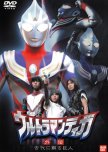
Ultraman Tiga Gaiden: Revival of the Ancient Giant
0 people found this review helpful
More like a DVD extra
Here's the thing about Ultraman Tiga Gaiden: Revival of the Ancient Giant, while it may be somewhat unremarkable as a little side venture and as an extension of the Ultraman Tiga story, the idea of setting a giant hero story in Stone Age Japan is an inspired one and an idea I could easily see being fleshed out again someday.Five thousand years ago, an ancient red-and-blue warrior of light defended a village against a giant, golem-like monster, but disappeared after that, where the Ultra is worshipped by superstitious locals as a guardian protector. In the present time of 2038, Super GUTS pilot Tsubasa Madoka (son of Daigo and Reina Madoka) pursues the monster Jomonoid, before suddenly getting dragged into a wormhole. Upon arrival, Tsubasa realized he's stuck centuries in the past, specifically, in the same village that Ultraman Tiga once guarded, and there are evil forces who want to prevent the re-awakening of Ultraman Tiga while re-summoning monsters of the past...
The original plan for Gaiden had been for Hiroshi Nagano to return as Daigo, but unfortunately, due to scheduling conflicts with his band V6's then-ongoing tour, he was unable to participate in the production. Thus, Daigo and Rena's son, Tsubasa Madoka, was created in his place. This isn't as major of a complaint as I'd initially thought because the new cast of characters is quite good fun, especially given the premise and setting with Tsubasa being quite a fun little protagonist even if he goes on a pretty similar journey to Daigo in learn to come to terms with co-existing as both himself and as Tiga.
There's a lot of lavish direction in this story thanks to the efforts of frequent Tiga, Dyna and Gaia director Hirochika Muraishi, who also helmed my beloved Final Odyssey. He makes great use of the larger budget the effects team were afforded and puts them to work with some stunning destruction sequences, the Kaiju vs Ultra fights are well staged, but there's the odd bit of front projection and CG that like most of the early Heisei Ultra shows hasn't aged very well.
The cast of Gaiden is all made up of returning actors from the entire TDG trilogy aside from Hiroshi Nagano and Takami Yoshimoto doesn't return as Rena either despite Letterboxd crediting both of them for some reason. Shôgo Yamaguchi is quite a fun protagonist in the form of Tsubasa and Yuri Yamazaki portrays a great badass in the form of the warrior Mahoroba, but I cannot get behind Makoto Kamijo as Amui who is borderline insufferable at times and pretty much robs Tsubasa of his heroic moments.
Tatsumi Yano retains much of the classic pieces from his Ultraman Tiga score and they all do their job just as well as they did in the TV show. Perhaps my biggest criticism is that both Take Me Higher and Brave Love Tiga are nowhere to be seen in Gaiden. Instead, Kodou~for TIGA~ is the theme and I'm honestly not a fan, it's one of the weaker songs that's been used to signify Tiga as a character.
Overall, Ultraman Tiga Gaiden: Revival of the Ancient Giant is ultimately little more than an extended episode of the TV show but its production more than carries it despite it feeling quite disheartening to not have the original cast in it. It's closer to an exciting DVD extra more so than a film.
Was this review helpful to you?
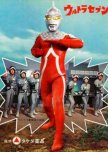
Big ups to our boi Seven
Of all of the Shōwa Ultras, Ultraseven is the one typically talked about in the highest regard and, honestly, it's not hard to see why. Often stated to be not so subtly influenced by Gerry Anderson's Thunderbirds, Ultraseven takes elements from that and its earlier Ultra incarnations by striking a balance between the mystery of Ultra Q and action-orientated Ultraman. However, it equally heavily contrasts Ultraman before it as Ultraseven expands much more on the concepts of alien invasions and militarism. It's a magnificent series through and through pretty much setting the standard for the Ultra series to follow. It can be viewed standalone as originally conceived or as part of the larger franchise as a whole thanks to the series to follow…Also, you can't talk about this show without mentioning the banned Episode 12, From Another Planet with Love. Yeah, the Aiken Spell is pretty yikes in the same vein as those mutated humans at the end of Prophecies of Nostradamus but like Prophecies the story and surrounding elements are pretty darn good.
I'll probably end up watching Heisei Ultraseven one day, same with Ultraseven X but I haven't heard the best of things surrounding them.
Was this review helpful to you?

Gets gud
Not the first in the Ultra series but one that shot it into the Japanese consciousness for years to come. The original Ultraman may show its age very early on with its rather backwards portrayal of society that contrasts heavily with what we know today, forced messaging and very limited budget, but from Episode 11 onwards you find the exact reason why this has remained a staple of Japanese Culture for nigh on 50 years.Ultraman is a myth that went on to inspire generations and we love it.
Was this review helpful to you?
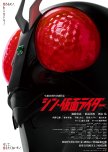
Pulpy Comic Book fiction done right
While he left our beloved Shinji Higuchi to handle directing duties on Shin Ultraman, Anno focused his efforts on Shin Kamen Rider and it's very much cut from the same cloth as its predecessors. Fast, stylish, cartoony and oh-so-charming, it opens with action and never slows down, not even afraid to fully embrace the camp and horrific qualities of its source material.I'll admit this is the tokusatsu property I am least familiar with (at the time of writing I've seen ZO, J, Shin Prologue and, more substantially, Den-O and Fuuto PI), but even to a more casual fan of the series, you can easily follow what is ultimately re-imaged episodes of the original show stitched together into a movie. I'm yet to watch the original but the number of side-by-sides I was seeing on Twitter after clips of it were leaked, shows that Anno really does take pride in his childhood influences.
Hyped stylised like the previous Shin movies, there's some very overbearing and pretty redundant CGI in places where practical effects would have been preferable and even cheaper, but it fits the same tone and energy of its predecessors. Anno's direction is great and features the same variety of angles and strange composition choices that make these so visually engaging. The hyper-choreographed fight scenes also help immensely, unafraid to go all the way to 11 with squishy violence.
With regular Anno collaborator Shirō Sagisu committed to Shin Ultraman, in steps Anime composer Taku Iwasaki and boy, does he do a stand-up job. I'm definitely gonna have to get the soundtrack to this the moment it's released, so many styles of music all coming together in a seamless blend of beauty.
While I ultimately feel that Shin Ultraman is the best of these Shin movies so far, Shin Kamen Rider is a very close second. Anno goes hell for leather here, amounting to a beautiful love letter to one of the grandfathers of Tokusatsu, having fun but not poking fun and fully embracing his inhuman worldview he's only ever touched upon in previous movies.
Was this review helpful to you?

The original Kamen Rider Shin
What could have been a great deconstruction of the Kamen Rider franchise sadly falters due to its bare-bones plot, wonky writing and unlikable stock character archetypes. It's one of the only Kamen Rider productions to feature direct creative input from the original creator, Shotaro Ishinomori, the film takes a large amount of influence from the original manga run as well as Kamen Rider BLACK's manga.The film was intended as a treat for more adult fans of Ishinomori's original works by Ishinomori himself but due to his death in 1998, the series planned to continue the story of this prologue never developed leaving Shin in a weird limbo of existence. The problems presented in this film could have easily been ironed out had it been given the chance but the final product is extremely stiff and somewhat bland compared to the likes of ZO which would release the next year.
I'll be honest, I like a lot of this film's production aspects, the music is frankly brilliant and it is that nice transitional period between the synth-heavy 80s and hard rock 90s; the gore and practical effects are simply top-notch with a seriously gnarly transformation sequence almost like it was ripped from a Cronenberg film with a design of the titular character being equally Cronenberg-esque.
Overall, the film is a curious example of when early 90's visceral science fiction met a classic Tokusatsu franchise. Still worth watching but with tempered expectations.
Was this review helpful to you?
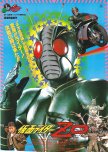
Love a bit of Amemiya
Given that Shin Kamen Rider is coming out next year, I really needed to dive into another of the big three Tokusatsu shows and this was usually the one pointed to as one of the best entry points of the franchise, Kamen Rider ZO is another fantastic film by Keita Amemiya that I can check off my watchlist. ZO feels like the by-product of what would happen if you threw Sam Raimi and Shinya Tsukamoto into a blender together, it's kinetic filmmaking and highly disturbing design that would give even someone like Guillermo del Toro nightmares. Brilliantly shot, written, scored, staged and acted, this is one of the best 48-minute-long films I've ever seen and has me eager to explore more.Was this review helpful to you?
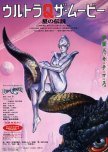
Ultra Q The Movie: Legend of the Stars
0 people found this review helpful
The missing link
Legend of the Stars feels like that missing link between Heisei Godzilla and Heisei Gamera, striking an otherworldly and transcendental balance in re-imagining Ultra Q for a whole new generation and who better to helm it than the franchise's most unique voice, Akio Jissoji. Legend of the Stars could realistically be considered the 2001 of the tokusatsu genre, mainly because this movie is pretty much a metaphysical examination of existence in a similar vein to Kubrick's film, just way more dialogue-heavy. It doesn't always hold together but Jissoji's visualisation is greater than the sum of its shakey parts, his direction and camera work are constantly engaging and ever-shifting with no two shots being the same. Combining aspects of Japanese mythology and a sci-fi mystery, Legend of the Stars is very much worthy of your attention even if you haven't seen the original show, it just drags its feet towards the end as if struggling to fill time and you'll have to put up with some substandard DVD mastering if you want to see it, it's crying out for an HD release. Come on Tsuburaya! Do it!Was this review helpful to you?
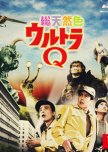
Where it all began
Ultra Q is very much the Japanese equivalent of shows such as The Twilight Zone and The Outer Limits. It's full of imaginative concepts and stories that when combined with the excellent production qualities of Eiji Tsuburaya you are left with one of the most unique shows of a lifetime. It's a tremendous blend of classic Tokusatsu science-fiction and horror that despite only being 28 episodes long, still leaves an impact. Of course, Season 2 of the show was long abandoned but naturally developed into the Ultraman series we all know and love today.Was this review helpful to you?

Zone Fight Power!
While I do ultimately feel that Zone Fighter is nothing more than an attempt by Toho to cash in on Tsuburaya Production's territory, Zone Fighter eventually manages to do enough to stand out amongst the seemingly endless surplus of Ultra shows with its family of superhero's dynamic plus some memorable guest stars in the form of Godzilla and company.The evil Garogas plan to take over Earth with their army of giant Terror-Beasts. They are opposed by the Zone Family, hailing from a planet called Peaceland that the Garogas destroyed. The family uses a variety of exotic vehicles and weapons. Still, their best defence against Garogas is their oldest child Hikaru, who is able to transform into the giant Zone Fighter.
The problem with Zone Fighter comes a lot from the tone, less so the production. It's a show that gets confused often as to what it wants to be. Some episodes are great, others border on unwatchable. It's a series Toho isn't especially proud of and director Jun Fukuda when asked about the show in interviews refused to even comment on its existence. Not really a good sign for the show in general.
The visual effects work stands up quite well for the most part with a multitude of different talents lending themselves to the series. Teruyoshi Nakano for 10 of the 26 episodes. Koichi Kawakita for 8. Yoshio Tabuchi for 6. Shinichi Kamisawa, who also wrote for the series, 2 episodes a piece. The direction is hit or miss, the ones directed by either Ishirō Honda or Jun Fukuda tend to be the more interesting ones and there are even two later episodes directed by Kōhei Oguri of House fame. So the show is hardly lacking in the visual department.
Further problems stem more from its writing and characters than anything else. At times juvenile and childish other times dark and sinister, the more childlike episodes stick out a lot more, it doesn't help one of the main characters is a child and his friends make frequent appearances with some godawful child acting to boot. Kazuya Aoyama, later appearing in Godzilla vs. Mechagodzilla, as the titular Zone Fighter does pretty much carry the show for the most part alongside Shiro Amakusa even if his role is massively reduced to that of a mentor. The rest of the characters, especially the villains are very give or take.
The music by Go Misawa is fine overall, the main theme "Zone Fighter" and the insert song "Meteor Victory" however, are massive earworms that won't leave you alone no matter how hard you try to erase them. There's a large usage of horns and brass present throughout and it can get overwhelming at points.
What really got me interested was Zone Fighter's presence in the Shōwa era Godzilla timeline, taking place after vs. Megalon but before vs. Mechagodzilla. It features the likes of Godzilla himself, King Ghidorah making an appearance in two episodes duking it out with Zone Fighter and not Godzilla and ultimately remains the only monster to not be killed by either in the show and finally the final appearance of Shōwa era Gigan. What happens to Gigan in this is almost unacceptable in terms of how he's defeated by the villain's incompetence more than the abilities of Godzilla or Zone Fighter. My poor boy.
Zone Fighter is a very real oddity of Shōwa Godzilla. It doesn't utilise its unique selling point to its full potential, as the show always ensures that Hikaru remains front and centre as its main hero. As much as it would like to reassure you that Zone Angel and Zone Junior are a key part of the show, ultimately it's always Hikaru that saves the day whilst Angel and Junior are acting as support. It's a shame because the glimpses you see of these supporting characters taking centre stage show you exactly just how remarkable Zone Fighter could have been but it seems to have been destined to end on an unresolved cliffhanger which I imagine Toho have no intention of ending.
Was this review helpful to you?
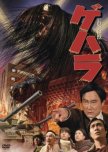
So much hair
One of the better kaiju throwbacks I've seen in recent years, Geharha: The Dark and Long-Haired Monster owes a lot to the bigger name franchises containing a wealth of references and homages interspaced amidst its quirky camp. A short made-for-TV production by one of the more prolific modern Ultraman directors, Kiyotaka Taguchi, barely clocking in at 20 minutes in length, it's a fabulous little gem. The effects are a charming mix of old-school tokusatsu techniques and hilariously low-brow CGI which often add to the short's comedic value. While the stock library of music from the late Akira Ifukube fits quite nicely, Geharha is over just as it really starts to get going, leaving you wanting more and ripe for expansion in a feature-length presentation.Was this review helpful to you?

Crazy Biker Road
Often hailed as Japan's Mad Max, Crazy Thunder Road becomes all the more impressive the more you learn about its production. Being a graduation project by director Gakuryû Ishii, it may be a narrative mess but the highly experimental style and limitless rockabilly energy produced a movie that radiates of pure aggression. There's a rough and ready charm to the effects and Kinji Fukasaku-influenced action, often drawing comparisons to Fukasaku's own anti-establishment protagonists with added grunge, grim and neon lights. The soundtrack is honestly my favourite part of the film, using songs by Japanese bands of the time in a near musical sense, it's combined with frantic editing and heightened emotions that immerse you completely within its context. Fast-paced, quick-witted and brilliantly stylised Crazy Thunder Road points toward a new style of genre filmmaking even if that direction is somewhat confused in execution.Was this review helpful to you?
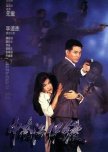
A superior Bodyguard
The Bodyguard from Beijing is a bit of lively, unpretentious fun that takes Mick Jackson's The Bodyguard but replaces Kevin Costner with Jet Li and the weird musical numbers with kung fu. Corey Yuen directs with a visceral energy that wouldn't be out of place in a Wong Jing movie and although, the writing is certainly a bit on the hokey side Li's charisma as a real man's man shines through. With plenty of high-energy and varied gunfights to keep you engrossed, a solid musical score and a fantastic final fight to boot elevate what could have otherwise ended up as a rather undercooked and stale riff, yes it's rather generic but there's a heart-beating somewhere underneath its surface.Was this review helpful to you?

The blueprint for Minus One
Complicated and nuanced as equally as it is populist and compelling, Takashi Yamazaki's The Eternal Zero is way too cluttered to assign any form of accurate assessment and yet, this highly thought-provoking tale on redemption and legacy is highly worthy of your time. Yamazaki effortlessly weaves together an engaging, expressive, sometimes exciting yet often horrifying depiction of a disgraced kamikaze pilot's life, never glorifying the nightmarish situation and always remaining sombre. The great performances sell the otherwise muddled script while its aerial combat is staggeringly realised with Yamazaki's creative use of visual effects and kinetic camerawork. More solemn and graceful, emotional and tragic, than downright high-octane and death-crazed as depicted in some Western war films, The Eternal Zero is an enormously evocative film even though it stumbles upon its final approach with an exceptionally jarring and sappy epilogue that feels very out of place with this otherwise excellent film.Was this review helpful to you?

Not the ending I'd hoped for
As the ending of a trilogy, Always Sunset on Third Street '64 isn't that great, it feels more like the build-up to the finale but ends before we get there. It also gets very confused about what sort of messaging it wants to send towards how to treat your children, but it ties up all the hanging threads it starts without losing the shtick that made the first two so special in the first place. Great performances, exceptionally wholesome and very well directed, Yamazaki could very well deliver one more film if he so wished, but I respect him for leaving it as a very personal trilogy to both him and his viewers.Was this review helpful to you?

More of what made the first one so damn special
Always Sunset on Third Street 2 offers more of what made the first one so damn wholesome, at times much more bittersweet, it retains the goodwill and warmth of its predecessor. Still just as unabashedly nostalgic and touching, Always 2 is exceptionally self-indulgent, very saccharine and perhaps a bit overlong, but it's also an excellent example of an emotionally satisfying drama with likeable characters and a wonderful sense of place and time. One that doesn't fail to get the tears welling, making for a feel-good film with loads of laughs. Extremely refreshing and just the tonic in these austere and pessimistic times. It shines bright. Although you just know every Godzilla fan has seen the opening 2-minutes of this and then nothing further, a huge injustice if there ever was one. However, you can certainly see why Yamazaki was chosen to helm the latest outing for the Big G with this sequence... I can't wait.Was this review helpful to you?





